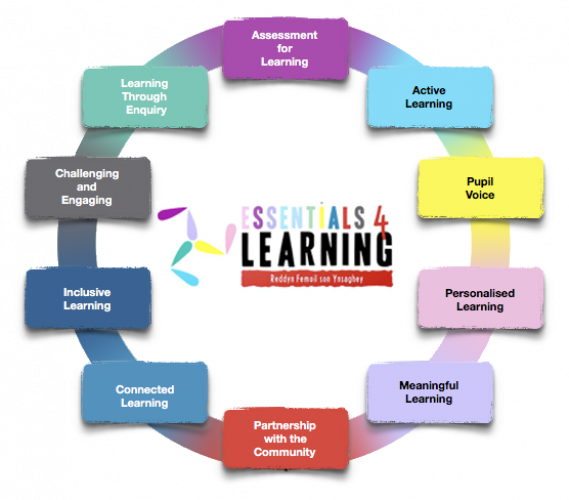There are 10 core principles which underpin learning in all Department of Education, Sport and Culture settings. Illustrated above.
Principles


There are 10 core principles which underpin learning in all Department of Education, Sport and Culture settings. Illustrated above.
You are viewing an item in the section:
'Essentials for Learning' (E4L) is the Department of Education, Sport and Culture's curriculum statement. It provides broad parameters for schools to develop flexible, exciting and memorable learning experiences and positive learning dispositions. "E4L's…
More in the section Principles:
Active Learning promotes independence and self regulation in learners. It provides frequent opportunities for them to contribute to and shape their own learning. Active learners experience high levels of creativity, enjoyment and involvement, whilst developing their ability to make decisions and th…
AfL is the process of seeking and interpreting evidence for use by learners and their teachers to decide where learners are in their learning, where they need to go and how best to get there. WATCH VIDEO
Challenging and engaging learning affords pupils frequent learning opportunities that develop knowldege skills and understanding and expand their capacity to learn. Pupils are intrinsically motivated through the development of a growth mindset in which risk, failure and challenge are seen as opport…
Connected learning makes explicit the relationship between knowledge and skills in different contexts. Opportunites to apply learning can be linked across different contexts, subjects, phases and settings. Frequent opportunites are provided to make sense of learning both in and out of the education…
Inclusion is an approach to the curriculum that values all pupils equally and aims to increase participation by reducing barriers to learning. Inclusion recognises the rights of all learners to an appropriate educational environment that meets their learning needs and celebrates diversity as an int…
Learning through Enquiry is the systematic process for the exploration of questions and lines of enquiry based on high levels of independent thought, evidence-gathering, analysis and reflection. WATCH VIDEO
Meaningful learning provides young people with a purpose and context for their learning and is responsive to the world of work, local and global community and personal interests and needs. Levels of pupil engagement and involvement are high and real life applications are evident.WATCH VIDEO
Learners benefit from the development of positive and constructive relationships through active partnerships with parents/carers and the wider community. Such partnerships enhance understanding of the learning process and develop opportunites for the application and extension of learning.WATCH VIDE…
Personalised learning aims to provide a more tailored education for every learner. It begins with an indepth understanding of each learners' needs, interests and abilities and then seeks to provide responsive, relevant and challenging opportunities that support them as they progress through their l…
Pupil Voice values the rights of young people to have an opinion and for others to listen and take it seriously. It involves pupils engaging in meaningful learning dialogues within their educational settings. It affords opportunities for pupils to improve the school by undertaking important leaders…